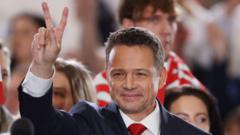In a closely contested presidential election, Warsaw Mayor Rafal Trzaskowski has emerged as the frontrunner, garnering 31.3% of the votes. However, this will not be enough for a direct win, as he must compete against conservative candidate Karol Nawrocki, who received 29.5%. The electoral commission reported a notable voter turnout of over 67%. To claim the presidency outright, a candidate must secure over 50% of the votes, pushing the electoral process into a run-off scheduled for June 1.
Warsaw's Liberal Mayor Advances to Crucial Presidential Run-off

Warsaw's Liberal Mayor Advances to Crucial Presidential Run-off
Rafal Trzaskowski, Warsaw's mayor, secures a narrow win in the first round of Poland's presidential election, facing a decisive second round against conservative rival Karol Nawrocki.
Trzaskowski, who is also a deputy leader in Prime Minister Donald Tusk's centrist Civic Platform party, expressed optimism at a rally, stating, "We're going to win," but acknowledged the challenges ahead. He has committed to working towards liberalizing Poland's stringent abortion laws and reforming the judiciary -- efforts that he argues have been impeded by the previous Law and Justice (PiS) government. Notably, pre-election polls had predicted Trzaskowski would perform better than he did by a margin of 4-6%.
Despite the largely ceremonial role of the presidency, its power to veto legislation poses a significant political hurdle for Tusk’s coalition, which currently lacks the majority needed to override such decisions. Nawrocki's support has been framed by his party as a bulwark against Tusk's political ambitions, urging voters from the far-right to rally behind him to thwart Tusk’s ascendance.
Both candidates will need to mobilize their bases effectively leading into the second round. Recent results from far-right candidates, including Slawomir Mentzen and Grzegorz Braun, introduce additional complexities—potentially fracturing the centrist and liberal vote. Trzaskowski must convince not only his own party's supporters but also those from coalition partners and disenchanted far-right voters. The electoral landscape is fraught with uncertainties, raising significant questions about where young voters and those from various political factions will cast their ballots in this pivotal election.
Despite the largely ceremonial role of the presidency, its power to veto legislation poses a significant political hurdle for Tusk’s coalition, which currently lacks the majority needed to override such decisions. Nawrocki's support has been framed by his party as a bulwark against Tusk's political ambitions, urging voters from the far-right to rally behind him to thwart Tusk’s ascendance.
Both candidates will need to mobilize their bases effectively leading into the second round. Recent results from far-right candidates, including Slawomir Mentzen and Grzegorz Braun, introduce additional complexities—potentially fracturing the centrist and liberal vote. Trzaskowski must convince not only his own party's supporters but also those from coalition partners and disenchanted far-right voters. The electoral landscape is fraught with uncertainties, raising significant questions about where young voters and those from various political factions will cast their ballots in this pivotal election.



















